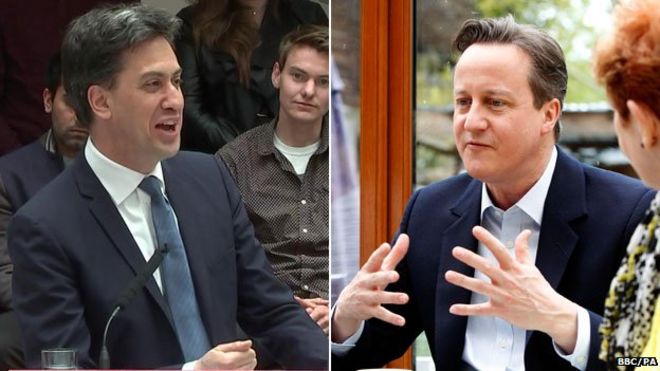
The leaders of the three main political parties are using the last weekend of the election campaign to win over wavering voters.
David Cameron urged people to choose their "preferred PM" rather than vote tactically for the Lib Dems or UKIP.
Labour leader Ed Miliband said there would be no special deals in Scotland if he becomes prime minister.
Lib Dem leader Nick Clegg is due to set out plans for a new taskforce aimed at tackling youth unemployment.
With five days to go before polling day, Mr Cameron warned people they need to vote Conservative if they want to stop Ed Miliband entering Downing Street.
£7,000-a-year basic pension
"In the end only one of two people can walk back through that door in Number 10 and be the prime minister on Friday," he told BBC's Breakfast programme.
"If you want your preferred prime minister, vote for your preferred prime minister.
"Don't take a risk thinking 'I'll vote Liberal Democrat and hope I get the prime minister I want' or UKIP and hope somehow it emerges.
"If you want me to carry on leading the country, making sure we have that stability and security in our economy, vote accordingly because we are only 23 seats short from that overall majority."
In other election news:
- Liberal Democrat leader Nick Clegg will set out plans for a new taskforce aimed at tackling youth unemployment aimed at helping 100,000 young adults
- Mr Cameron said his comment on Friday that the election was a "career-defining" moment, which he then at the time appeared to correct to say it was a "country-defining" election, had been intentional. "I meant it. I meant it for the people I was talking to," he said, referring to the audience at Asda in Leeds.
- Labour and Plaid Cymru have clashed on whether the two parties could work together if the election results in a hung parliament in a BBC Wales' televised leaders debate
Mr Cameron made the appeal ahead of a visit to Didsbury, Greater Manchester, to promote the party's "pensioners' manifesto".
He met a group of pensioners and highlighted his party's commitment to the "triple lock" on state pensions, which means they rise by whichever is higher out of inflation, average wages, or 2.5%.
He said the triple lock - which Labour says it is also committed to - would take the annual basic state pension to £7,000 a year by 2020.
He also outlined other previously-announced proposals, including the protection of benefits such as free bus passes and TV licences, and giving people more freedom to invest and spend their pensions.
In an earlier interview, he insisted there would be no cuts to child benefits as part of his pledge to make £12bn in welfare savings.
Meanwhile, on a visit to the marginal seat of Hastings on Saturday, Mr Miliband hit back at Conservative claims that the only way Labour could get a majority was with the SNP.
Instead he accused the Conservatives of using the SNP to distract voters from their own record.
"What this election really comes down to is not a clash of two nations but a clash of two visions," he said.
"Two different plans ideas about how our country succeeds."
He said the Conservatives offer "huge tax cuts" for the "rich and powerful", whereas Labour thinks "Britain succeeds when working people succeed".
But Labour former Scottish first minister Henry McLeish said Mr Miliband may have little choice but to negotiate with the Scottish Nationalists.
"At the end of the day, Ed is not going to exclude himself from being prime minister by not talking to anyone," he told BBC Radio 4's Today programme
Mr Miliband also used the East Sussex hustings to outline his party's plans to introduce bills for 10 of his manifesto proposals by the end of May.
These would include a "strong economic foundation bill" which would implement a mansion tax and tobacco levy; freezing energy prices until 2017; banning recruitment agencies from hiring only from overseas, and cutting university tuition fees from £9,000 to £6,000 in England.


0 comments:
Post a Comment